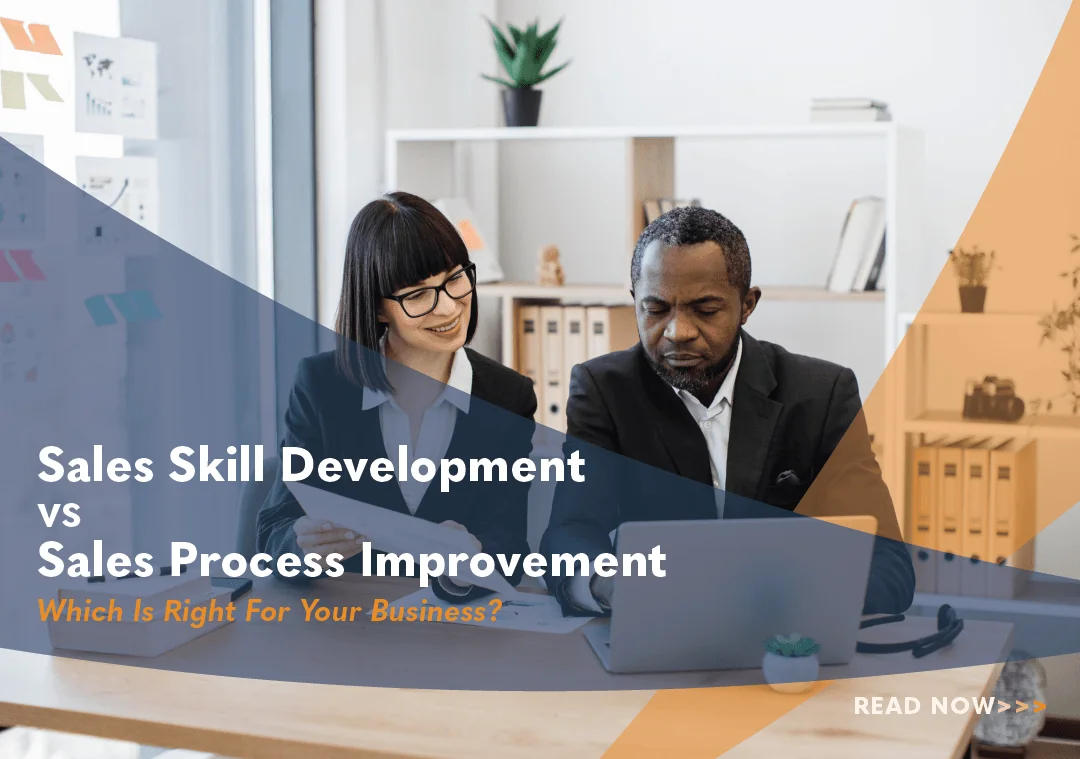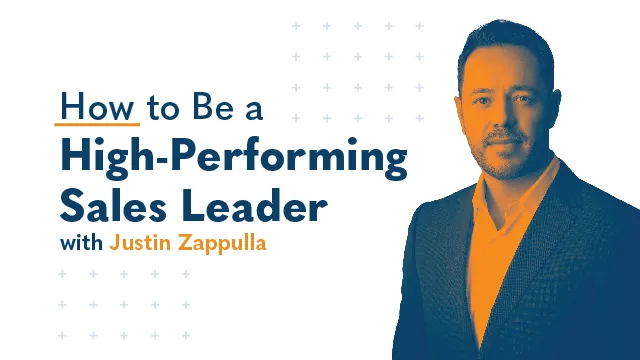Sales Skill Development vs. Sales Process Improvement – Which Is Right For Your Business?

If there is one question sales leaders want the answer to it is: What’s the fastest way to improve sales performance? While the answer is unique to each sales organization and their situation, two areas tend to bubble to the top often:
- A focus on improving the sales skills of your sales team
- A focus on improving the sales process of your organization
For some sales organizations, the fastest way to improve sales performance is by improving the sales skills of the sales team. With other organizations, improving the sales process is the best way to drive significant sales improvement. In this article, we will provide insights and directions to help you decide where to focus your resource for the most significant sales improvement.
Sales Process Definition: Gartner defines the sales process as a systematic, multistep approach that enables a sales force to close more deals and increase margins. An effective sales process is built back from a customer buying journey.
Sales Skills Definition: Indeed defines sales skills as a specific skill set that facilitates identifying sales opportunities, building a rapport with customers, and successfully closing sales.
This definition creates another key question…
Do your sales reps have the required skills to execute your sales process?
As a sales leader, your first step to creating a high-performance sales team is to ensure that your sales process is aligned with how your customers prefer to buy. Unfortunately, too many sales organizations have been following the original sales process since the company’s conception and are not taking into consideration how the modern buyer prefers to purchase. Other companies have changed their sales process but have not upskilled their salespeople’s competencies. Both situations are less than optimal.
For instance, due to the pandemic, many sales organizations transitioned to a virtual sales process. Because of travel restrictions and social distancing, many of the traditional steps of the sales process had to be changed. Buyers started working from home, stopped attending trade shows, and sales reps were not invited to in-person meetings. Organizations were forced to change their sales process to accommodate their prospect’s new buying journey or suffer the consequences.
Today, virtual selling is the new normal, and it is here to stay. Traditional sales organizations with outside sales reps had to quickly pivot to new virtual processes. The new sales process required the salespeople to learn new skill sets. In addition, it required sales leaders to learn to coach and manage from a remote location. The challenge for sales reps and sales leaders is how to make the virtual meetings as impactful as in-person and face-to-face meetings. The new sales process requires new sales skills.
Shifting from an in-person to a virtual sales process demonstrates a key reason why an organization would change its sales process: Removing friction from the buyers’ purchase decision. The more friction you require your prospects to tolerate in your sales process, the longer the decision-making process. Creating a frictionless buying experience that has a high impact is what the modern sales process should accomplish. If your sales process has obstacles, however minor, you are pushing potential clients to your competitors.
Some of you are probably thinking, “But we switched to a virtual sales process, how else can we remove friction?” The answer is simple: When your sales team cannot deliver a compelling digital experience, they are adding friction to the sales process.
For example, how often do prospects struggle to align their calendar to your sales reps calendar? How often are meeting participants absent from online meetings? Was there two-way communication in the virtual meeting or was it a mechanical deck presentation? A fundamental aspect of the modern sales process is using technology to make the buying process easier. But adding new technology to the sales process without providing detailed procedures can leave too much to the imagination of the sales rep. When that happens, the quality of the experience will vary widely. Inconsistency is the route to low performance.
Most organizations rarely make changes to their sales process and, therefore, make little, if any, real improvements to their sales performance. A typical problem we see repeatedly is that sales leaders fall into habits that worked in the past but are not aligned with the prospect’s buying preferences today. The sales leader recognizes that sales performance suffers but cannot come up with transformative solutions themselves. A better idea is to look for solutions outside of the executive offices.
As a sales training company, we often hear from sales leaders who share their insights during discovery calls:
- “We can’t find any talented salespeople.”
- “No one can sell like me.”
- “My sales team is inconsistent. Some months they sell a lot, then the next month they sell very little.”
The core business challenges that are often at the root of these issues are with recruiting, training, and managing a high-performing sales team. In other words, it’s not a market problem caused by a shortage of sales talent. Instead, sales deficiencies are caused by inconsistent sales performance.
Ask yourself if the following statements apply to you and your organization:
- Every step of the sales process is documented.
- Every sales rep follows the sales process with consistency.
- Our sales process is aligned to the way our customers prefer to buy.
If you answered false to any of these statements, you have an opportunity to improve your sales performance. Companies that don’t have a detailed sales process in place will continually waste time struggling with the same issues. But companies that take the time to document and enable their sales team will be able to radically transform their sales performance.
Hopefully, at this point, you can see that sales skill development and sales processes go hand in hand. But the key to success is building the sales process based on your ideal customer profile buying criteria. By matching your sales process to the buyer and then upskilling your sales team, you can scale your growth. Alternatively, if you have a poor sales process and are hoping to find superstar salespeople, you are essentially playing the sales lottery. Instead of thinking you are one hire away from growth, double down on improving your sales process and holding your sales team accountable to the process.
As sales leaders, business owners, and CEOs, there is no shortage of challenges and opportunities to work on. Figuring out which ones are most critical to achieving your long-term goals is every leader’s responsibility. Too many sales teams are following an inconsistent sales process and, therefore, are generating inconsistent results. According to a 2015 Harvard Business Review study, companies that created and followed a formal sales process generated 18 percent more revenue than companies that did not. Our experience as a sales performance company proves there is no secret to high performance. It requires a unique sales process that matches your clients’ buying criteria, training your sales team on critical sales skills, and having your sales leaders hold the team accountable.
If you are a sales leader and your team is struggling to deliver consistent performance, we can help. From talent management to process and strategy to coaching and training, we have helped 100s of organizations transform their sales performance. Curious to learn more? Let’s talk.

- Account Planning (11)
- Awards (50)
- Client Testimonial (37)
- Personal Branding (19)
- Podcast (11)
- Research (68)
- Sales Career Development (85)
- Sales Coaching (153)
- Sales Consulting (133)
- Sales Culture (164)
- Sales Enablement (340)
- Sales Leadership (108)
- Sales Management (242)
- Sales Negotiation (16)
- Sales Prospecting (124)
- Sales Role-Playing (18)
- Sales Training (229)
- Selling Strategies (255)
- Soft Skills (67)
- Talent Management (92)
- Trusted Advisor (27)
- Virtual Selling (41)
- Webinar (10)





























